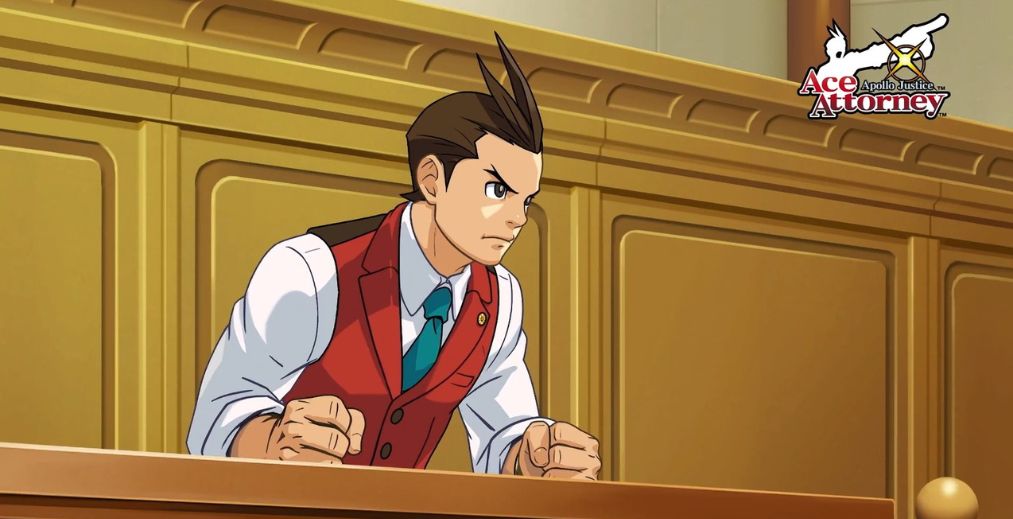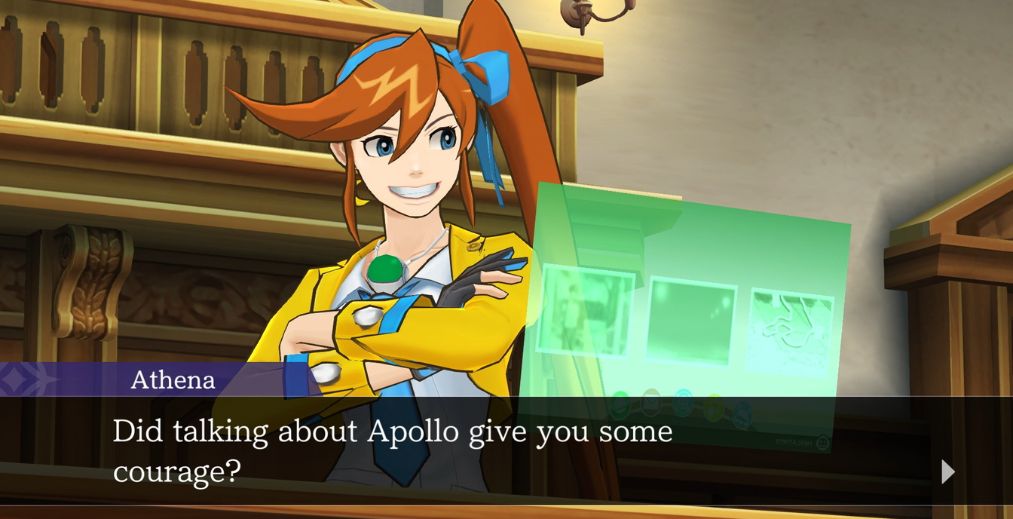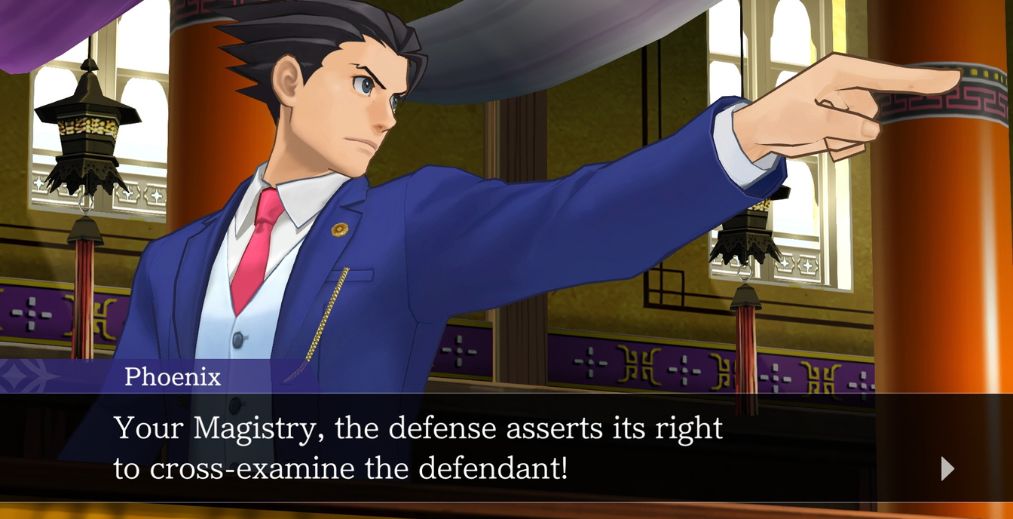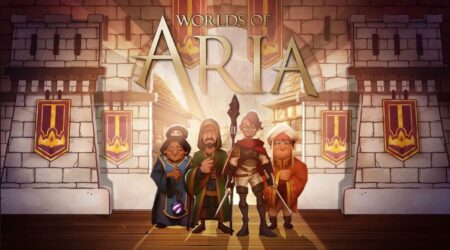Apollo Justice: Ace Attorney Trilogy is Capcom’s latest bundle of Ace Attorney joy and a follow-up to the well-received Phoenix Wright: Ace Attorney Trilogy, which launched over a decade ago. After spending an absurd amount of time on the investigative visual novel collection, I can confidently say that while it’s not the best the series offers, the games provide a highly engaging experience regardless.
Apollo Justice: Ace Attorney Trilogy includes the last batch of mainline games from the highly beloved Ace Attorney series, including the titular character Apollo Justice. The trilogy consists of Apollo Justice: Ace Attorney, Phoenix Wright: Ace Attorney – Dual Destinies, and Phoenix Wright: Ace Attorney – Spirit of Justice. These are notably the latest three games in the mainline series. As such, these games have some of the most advanced features across the franchise and some of the most engaging—albeit sometimes convoluted, stories and cases.
Apollo Justice: Ace Attorney

The first game, Apollo Justice: Ace Attorney, is the last of the great 2D games in the series and introduces multiple new characters. The game occurs several years after the previous game and introduces Apollo Justice, a new rookie attorney. The story starts with a bang by having players defend legendary series protagonist Phoenix Wright himself, who’s since been stripped of his attorney status after the events of the previous games. Now, he’s been accused of murder, and it’s up to Apollo to prove his innocence. After the first case, Apollo becomes his apprentice and works with Phoenix’s new daughter to solve four cases in the entire game through investigations and trials.
Story-wise, Apollo Justice is by far one of the most engaging games in the series. It sports a highly engaging narrative with high stakes and lots of twists and surprises, specifically concerning the culprits of the murders. The characters are also quite endearing, especially Apollo, who breathes new life as a young boisterous attorney.
In Apollo Justice, players can use new mechanics to solve cases, such as Apollo’s unique ability, the Perceive System, which allows the player to detect the nervous habits of witnesses and inconsistencies during their testimonies. This then enables players to know which statement is true and which isn’t and unlocks new leads for solving mysteries. The mechanic enhances the gameplay experience by adding a layer of depth to investigations, thereby making them more intricate.
Apollo Justice also introduces the “jury system” to court cases as part of the returning cross-examination structure when questioning witnesses. With this system, players must present compelling arguments and evidence to sway the jury in their favor, adding a strategic element to the game. Like in previous games, players win cases in two phases in Apollo Justice: investigations and trials.
Players question characters and examine objects during the investigation phases to learn more about the case. During trials, players confront inconsistencies by presenting evidence they’ve uncovered and question witnesses. As the last purely 2D game in the series, the game’s aesthetic evokes a unique charm that’s consistent with previous titles. Overall, Apollo Justice is a fantastic entry in the series gameplay-wise, visually, and narratively.
Phoenix Wright: Ace Attorney – Dual Destinies

Phoenix Wright: Ace Attorney – Dual Destinies, the fifth main installment, introduces several new elements in the series. This includes all-new 3D graphics, dynamic camera angles, and, most notably, the new character Athena Cykes. It also presents several intense yet captivating cases and investigative elements.
The game’s story takes place a year after the previous title and starts with an animated cutscene that shows a bomb exploding in a courtroom during a case. This unsurprisingly starts off a whole new investigation to find out who the culprit is, and of course, it’s up to attorneys Apollo, Phoenix, and the newest member of his firm, Athena Cykes, to find out who the true culprit is before proceeding to prove the innocence of several characters across multiple episodes.
The game also takes place during a time when confidence in the world’s court system, which is plagued with false charges and fabricated evidence, is at an all-time low. This inevitably affects the events of the game’s narrative as players face blatantly unjust scenarios and have to find a way to overcome them to succeed.
The story in Dual Destinies is noticeably a bit darker than the previous title. This is especially seen through Athena’s backstory which is one of the more tragic ones. The game also explores several of the returning characters’ stories and gives players an insight into its overarching narrative, which explores themes of justice, morality, and the responsibilities of legal professionals. However, it’s worth noting that despite having narrative depth, the game’s mysteries aren’t as engaging as in the previous game. As an example, some of the culprits are almost blatantly obvious, so players often spend a lot of time trying to find a culprit they probably already know.

Gameplay-wise, like in the previous game, players win cases by investigating clues and talking to characters to gain further information on each case. They’ll win trials by cross-examining witnesses, highlighting inconsistencies, and presenting evidence.
However, Dual Destinies also introduces Athena Cykes’ “mood matrix” technology. This new mechanic allows players to read witnesses’ emotions and expose their conflicting emotions when recalling memories. Pinpointing these contradictions brings new light to the case and, in turn, unearth answers that support known evidence. Here, you use the “revisualization” mechanic to reach a final conclusion when every mystery has been solved and questions answered. All these new inclusions make gameplay more refreshing and engaging than the previous title.
Visually, Dual Destinies takes the franchise in a new direction with 3D modeling. While this gives the game more emotive faces and precise character movements, it doesn’t look half as good as its 2D counterparts. However, the game also introduces new 2D and 3D animated cutscenes. The 2D cutscenes, while short, are excellently animated by the legendary studio Bones, and the 3D cutscenes allow the characters to make motions that they previously couldn’t. These scenes are also all voice acted really well in several languages.
Overall, while not as narratively engaging as its predecessor, Phoenix Wright: Ace Attorney – Dual Destinies provides an engaging experience with its new inclusions that are also of great value to the series moving forward.
Phoenix Wright: Ace Attorney – Spirit of Justice

Phoenix Wright: Ace Attorney – Spirit of Justice is the last installment in the bundle and the last mainline game so far. It continues roughly a year after Dual Destinies and includes all the newly introduced elements.
Spirit of Justice sees Phoenix Wright travel to the mystical kingdom of Khura’in to meet his friend and recurring series character, Maya Fey. However, in the process, he quickly becomes involved with a murder surrounding his tour guide, Ahlbi Ur’gaid, who is accused of stealing the Founder’s Orb relic and murdering a security guard.
Phoenix decides to help defend him and prove his innocence but discovers the oddities with the kingdom’s legal system and its “Divination Séance,” a unique legal system that reveals the victim’s last moments. Phoenix successfully proves Ahlbi’s innocence but is then embroiled in a legal revolution. Meanwhile, Phoenix’s two associates, Apollo Justice and Athena Cykes get involved in a case involving the death of Dhurke Sahdmadhi, a revolutionary leader in the kingdom. This case leads to revelations about Apollo’s own family history, and the setting succeeds in offering a fresh slate for both new and returning players.
Spirit of Justice presents us with a brand new fictional setting alongside new characters and stories to engage with. However, while these narrative elements are interesting and breathe new life into the series, the overall story feels the weakest as many of its cases feel dull and overly stretched out for no apparent reason, making them feel less engaging. Many of the side characters are also one-note and rely on off-putting gimmicks.
The gameplay is mostly similar to Dual Destinies, with the exception of the new Divination Seance, where you are presented with the last moment of the victim’s death in the form of a short video. From there, you’re expected have to judge the insights they see and point out any inconsistencies to find the full truth of the case. The problem with this mechanic is that aside from being a new visual element, it doesn’t provide any strong use because most of the discoveries, like how a victim died after the lights were cut, would have been better learned through dialogue or investigations. As such, these moments only succeed in stretching out cases more than anything else. Visually, Spirit of Justice retains the Dual Destinies look but features more cutscenes than the last game.
All in all, the three visual novel games included in the Apollo Justice: Ace Attorney Trilogy, though not without their flaws, are excellent in their own ways and provide hours of engaging content. Additionally, the games run well on the Switch with few long load times and a stable framerate.
As a bonus, The Apollo Justice: Ace Attorney Trilogy also comes included with all previously released content, including special DLC episodes and outfits for the last two games. It also features an Orchestra Hall mode to play all music from the three games, an Art Library to see all new and old artwork and an Animation Studio where players can play all the animations included in the games. As such, players looking for a complete package should have no complaints with the bundle.
Apollo Justice: Ace Attorney Trilogy will launch on January 25, 2024, for Nintendo Switch, PC, PlayStation 4, and Xbox One.
Apollo Justice: Ace Attorney Trilogy
-
Rating - 8/108/10
TL;DR
All in all, the three visual novel games included in the Apollo Justice: Ace Attorney Trilogy, though not without their flaws, are excellent in their own ways and provide hours of engaging content.







